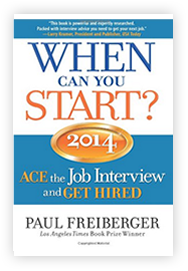Paul Freiberger's Blog
July 3, 2015
How to get the job if you appear overqualified
It’s like Meryl Streep auditioning for the community theater production of “Our Town.” Or, Jim Harbaugh applying to coach the local Pop Warner team. Perhaps you’ve had the feeling or you’ve been told that you are overqualified for a job that you want.
It may not seem fair. But that’s life. You have to accept it or do something about it.
The key piece of advice is to focus on the benefits that you bring to the employer. When an employer perceives self-benefit you are moving in the right direction.
January 29, 2015
Making Small Talk and the Job Interview
to Get You Off to a Good Start

“Thank you very much for meeting with me today.”
If you don’t have the gift of gab and can’t imagine getting through the initial small talk of a job interview, rest easy. This interview has just enough structure to make it an easy task for even the worst conversationalist. This is not a cocktail party, where your small talk, once it begins, may never end. You’re even blessed with an easy place to start. Open things by saying thanks: “Thank you very much for meeting with me today.”That’s pretty simple, but what’s next? Strangely enough, your contact may respond immediately to your brilliant opening—“You’re welcome”—and he may even go on from there. If he does, you’re off and running. If he doesn’t, the ball is back in your court, but take heart. One secret of good small talk is the ability to put the focus on the other person, and that’s a very natural next topic here. What’s more, you can keep things moving by asking an implicit question. “I hope this time worked out in terms of your schedule today and that it’s not too much of a disruption.” You’re inviting a response, and you’re likely to get one. A contact who was willing to meet with you is not likely to tell you that the timing is terrible and he wishes you’d just go away.
 Lots more on this topic in
Lots more on this topic inWhen Can You Start?
Ace the Job Interview and Get Hired.
January 22, 2015
Take a Page from Julia Child’s Cookbook for Career Change

January 9, 2015
Determination in the Job Search Gets You Far
Call it what you will—persistence, determination, toughness, tenacity, mule-like stubbornness. By any name, it’s the single biggest determinant of job-search results. No job-search strategy trumps a person’s sheer ability to keep at it.
Why is that? What makes it hard to persist? And what can you do about it?
The single biggest problem you face as a job seeker is not finding the typos in your resume or selecting the right font. It’s not deciding if you should go with the red tie or the blue tie for an interview, or figuring out what type of handshake makes people trust you. Ultimately, it’s not even finding the right job openings.
December 21, 2014
Happy Birthday to the Anti-Steve Jobs
It’s 11 feet long and 7 feet high, weighs 5 tons and is remarkably relevant to Silicon Valley.
It comprises 8,000 separate parts. (Astonishingly, the inventor’s original plan called for no less than 25,000 parts.)
An imposing metal contrivance, the very peak of the machinist’s art, it would make the ultimate Christmas gift for any steampunk enthusiast . . . but what is it?
Find out here: This 19th century development has been part of a universal career upshift that hasn’t stopped.
October 28, 2014
LeBron James and Leonardo Share a Core Value: Lifelong Learning
Today, a prospective employer might look at Leonardo’s resume and be troubled by his seeming lack of focus. Leonardo, though, was not a jack of all trades and master of none. He was a master of many, and his mastery came about because he never stopped learning. Never stop learning and opportunities will never stop flowing to you. Leonardo is an example from the past. More recently, LeBron James and Tom Brady provides a role model for the value of lifelong learning. Read more about this vitally important topic of lifelong learning.
October 17, 2014
Top 5 Bay Area Startup Companies for Job Seekers
Trying to figure out which are the right startups to consider in your job search? The top startup companies for technology job seekers in the San Francisco Bay Area (including Silicon Valley), ranked by LinkedIn are:
1. Lytro: Mountain View, CA: Lytro is transforming the camera into a powerful computational photography platform, forever changing the way everyone takes and experiences pictures.
2. Theranos: Palo Alto, CA: A maker of low-cost blood-test equipment.
3. Fitbit: San Francisco, CA: A maker of technology health and fitness products.
4. Coursera: Palo Alto, CA: Educational platform that partners with universities and other organizations.
5. Minted: San Francisco, CA: Provides a marketplace for stationery, wall art and party decor from independent graphic designers.
October 15, 2014
Is a Job Interview the same as a sales call?
Is a job interview exactly like a sales call? No, there are clear differences. An interview is not an explicit demonstration of what you can do. Instead, you’ll be asked about your background and your accomplishments. You’ll talk about yourself and your work history. Through all of that, you’ll be selling. Your interviewer is, in essence, your customer, and qualifying that customer is just as important as any product sale, of course. You are the one who benefits most of all.
The meaning of qualification is the same even though you are the interviewee. You still must ask questions with the goal of learning as much as you can about the customer. It still means asking questions and getting to know your customer.
Leonardo DiCaprio’s character in The Wolf of Wall Street provides insights worth our consideration.
For a detailed discussion of the key ways to qualify your customer, see this article.
October 9, 2014
Goodbye Google. Farewell Complacency
Michael Peggs publicly (very publicly) told the world last week that Google is not always the dream job. He had pre-announced his departure on September 16 in an article in the Huffington Post, called “I’m Quitting Google in 10 Days: In Search of Me, Myself and I.” He’s not going to get sympathy as he moves on to start his own firm, but his video declaration is entertaining and it makes you think. It certainly gets me curious to keep on eye on his next venture. Good luck Michael!
October 2, 2014
Sell Me This Pen: How to answer the key sales job interview question
Sell me this pen.
If you’re in sales, that’s the task you’re likely to be given in a job interview. Sooner or later, an interviewer will reach into his pocket, pull out a pen and ask you to hit him with your very best pitch.
It’s a task that achieved some fame when it appeared in “The Wolf of Wall Street,” with Leonardo DiCaprio playing the role of Jordan Belfort, a notoriously crooked stock broker. In the film, DiCaprio asks a group of friends he’s recruiting as salesmen for his boiler-room operation to sell him a pen he takes from his pocket. One recruit nails it – supposedly – by taking the pen and asking DiCaprio to sign his name. When DiCaprio can’t sign without the pen, the salesman wins, with the sale somehow driven by “supply and demand” or some form of “urgency.”
At least that’s the Hollywood version.
When asked about the pen, the real-life Belfort says the movie gets it all wrong. The question is actually a trap, and it lets Belfort tell the rookies from the real sales stars.
What’s the difference?
The novice makes it all about the pen. The pen writes under water and upside-down. It’s available in the same colors Da Vinci used to paint the “Mona Lisa.” If you misplace it, it will sprout legs and find its way back to you like a faithful dog crossing mountains and rivers to find its master.
Plus, it’s mightier than the sword!
In other words, the novice talks about the pen. He concentrates on its features or, if he’s a bit more polished, on the presumed benefits of owning this miraculous pen.
The seasoned professional knows better. He knows that it’s not about the pen at all. Instead, it’s about the customer, because you can’t sell the pen – you can’t sell anything – unless and until you know whom you’re selling it to.
The best approach, then, starts with questions, not statements. When do you use a pen? What do you use it for? Do you use it for jotting quick notes on the fly or for signing important documents? How long have you been in the market for a pen? When did you last use one?
Once you have answers to those questions, you can start to position what you’re selling so that it fits your customer’s needs. Without those answers, you’re whistling in the dark, selling features that don’t matter and benefits that don’t apply.
When asked to sell the pen, forget the pen. It makes no difference what’s for sale. The principle is always the same.
What matters is the customer. If you remember to put your efforts into knowing the person on the other side of the desk, you’ll sell a lot more pens, and it’s not just about the job interview. You’ll also sell a lot more cars or houses or widgets or gizmos, and you’ll sell them anywhere you’re trying to make a sale.
For a further description of answering this important question, I elaborate it on it here.












